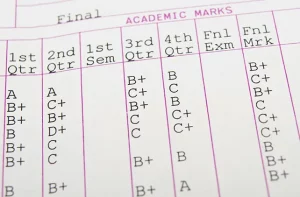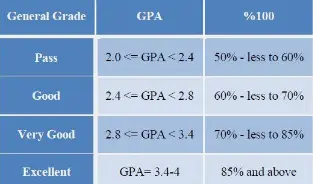Did you know that schools now give quarter grades? Quarter grades are a major topic of contention for many college students.
If not, you might wonder if your child’s grades are accurate and if such a change is a good one. This article will explore and explain a few reasons why you need to care about your letter grades.
What are Quarter Grades?
Quarter grades are the final grades for each quarter. The institution will not post them until after the end of Quarter 4. Grades are calculated based on your performance about the standards you are supposed to complete.
Each standard is worth a different number of points, and your grade is a percentage of the total number of points earned.
Quarter grades are important for several reasons. First, even if a student has been doing very well in a class and then gets a bad grade on one test or assignment, that grade could significantly bring down the quarter average if it is weighted heavily.
Second, if the quarter averages are not good, students may not be motivated to work as hard on their final exams. They motivate students by providing them with early feedback about how they are doing.
Finally, quarter grades may help predict how the student will do at the end of the semester or school year.

Notably, students who get low scores at the beginning of a marking period all too often give up, assuming that it is too late to improve their overall performance.
Another use for quarter grades is to help teachers determine whether or not they are being fair and unbiased when grading each student’s work.
If there is a large discrepancy between the grades assigned by different teachers in the same class, especially if those differences are consistent over time that could indicate an issue with bias in grading.
For example, if one teacher tends to give higher scores than other teachers in his/her class while another teacher tends to give lower scores than other teachers in his/her class (e.
Do Quarter Grades Matter?
Yes and No
Yes, quarter grades are important. Quarter grades are the first piece of data that admissions officers see in your transcript, and they make up 40% of your final grade.
Colleges look at all four years of high school in determining whether or not you are admissible, but they will look at your freshman year grades more closely than your senior year.
If you struggle during your freshman year, it is important to take action to improve upon those grades in the later years or explain why you did poorly during that time.

Also, quarter grades matter because they give both you and your counselor an idea of how you are doing in your classes.
But, the grades on your transcript at the end of the year are much more important.
You should be working with your teachers to improve your grades during the quarter and make sure they reflect what you’re capable of by the time they’re recorded officially.
No
No, quarter grades do not matter too much. A couple of Cs in one quarter will not keep you from getting into college or receiving a scholarship. But if you continue to do poorly throughout high school, colleges may question if you are ready for college-level coursework.
Similarly, it is also important to remember that colleges do not see quarter grades. They only receive information at the end of each semester, so if you have a bad quarter, work hard to improve your performance in the following quarters.
How Much Do Quarter Grades Matter in the Final Grade?
A student’s final grade in a class is often based on four or more quarter grades. If the teacher does not specify a weight for each quarter grade when assigning it, all quarter grades have equal weight.
For example, if a student receives an 85% on one test and an 82% on another test, both tests would weigh 50% when calculating the final grade.
If the teacher assigns different weights to each test grade, it is still possible to figure out what each test is worth by dividing 100% by the total number of tests.
If there are four tests and each test has a different weighting number, then each test is worth 25%.
However, if two tests have 80% weights and two other tests have 20% weights (for example), these two weighted percentages must be added together to find out what they are worth. In this case, adding 80% + 20% = 100%,
The most important factor to consider when calculating quarter grades is how they affect the final grade. If your quarter grades are worth 20 percent each, you will have to earn at least a C in each quarter of a class to pass the course.
If quarter grades count for 30 percent each, then you will only need a B+ in two quarters and a C+ in one quarter to pass.

The effect of quarter grades on final grades can be significant because even a small difference in your overall grade can bump you up or down a letter grade.
For example, if you had an A-average after three quarters but earned just a D on your final exam, your average would be below a B+.
If you had earned an A-average after three quarters but earned an A on your final exam, your overall average would be above an A-.
Tips on How to Increase Your Quarter Grades
- Set specific goals. For example, don’t say, “I want to get better grades.” Instead, say, “I want a B or higher in this class.” Then, write down your goal and post it somewhere you’ll see it all the time.
- Get organized. You can’t get good grades if you continually miss assignments, forget deadlines, or lose important things. Set up an organization system that works for you, whether on paper or electronically. Remember that different classes will require different types of materials (e.g., lecture notes and readings), so you will need different systems in place for each class and each project requiring organization
- Develop practical study skills. Learn the best ways to memorize new information, organize your homework and take notes during class to use the information when it comes time to do your work.
- Manage your time well. If you find that you have lots of free time and still are not getting good grades, you may need to add more study time into your schedule.
- Attend all your classes. You do not have to sit in the first row but make sure you can see and hear what is going on.
- Read the assignment before class to follow along and know what questions to ask if something is unclear. If there are vocabulary words, write them down so that you can remember their meanings later when studying for a test.
- Take good notes during lectures, and save them in an organized notebook or binder where they will be easy to find when it is time to study for tests or complete assignments. When a teacher is giving examples of something, write them down too! It will help it stick in your head better, mainly if you write it down more than once.
- Spend 30-60 minutes studying each night for each class, no more than 2 hours total. Do not wait until the night before a test to begin studying! Include all your notes, homework assignments, and any other handouts from class in your studying materials.

Joseph is a freelance journalist and a part-time writer with a particular interest in the gig economy. He writes about schooling, college life, and changing trends in education. When not writing, Joseph is hiking or playing chess.
